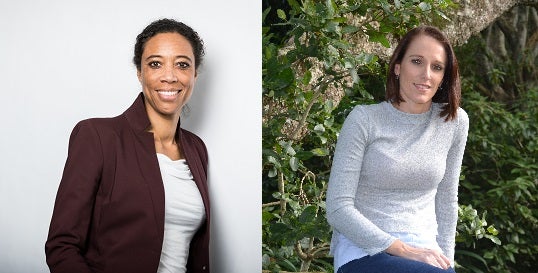Upfield believes that the future of food is plant-based. The largest plant-based consumer product company in the world has been a client at dentsu for 4 years. Being the #1 producer of plant-based spreads globally, with iconic brands FLORA, RAMA, BLUE BAND, PROACTIV, BECEL, and COUNTRY CROCK brings responsibility. A sustainable future is a standard they don’t only set for all our their products. But also in their leadership team. An inclusive culture is what they strive for and believe in. We had an honest conversation with Dior Decupper, General Manager Upfield Netherlands and Lauren Tolond , Marketing Director Upfield about what they #ChoosetoChallenge within their daily jobs.

Based on your experience, what are the building blocks of an open and inclusive culture?
Dior: “For me that is the “come as you are” culture. A company and a work culture where what you see is what you get: you don’t need to pretend, you can express yourself, in a respectful manner, always, and speak your mind. What is the point of being diverse and inclusive if we all don’t bring forward our uniqueness, in terms of thinking, being who we are and expressing our passions. Also important is the absolute consistency between what is on paper and how the company lives and breathes. We need to create an environment that protects and brings forward the “come as you are” spirit.
Lauren adds and agrees: Whilst there are many building blocks to help drive an open and inclusive culture, there are four that stand out for me. Indeed the first building block is leading by example and whilst this seems so simple, it is not always easy to master. If a leadership team all look, sound and think the same, it sends a clear signal to their teams that they should try and fit into that same mould which I call the “cookie cutter effect”. This does not help build an inclusive culture. If a leadership team is truly diverse and drives inclusivity, then their teams learn to value this as well. To drive it, you need to be it!
Secondly, teams need to believe that diversity is a real competitive advantage and that you will not win without it. If teams really believe this, they will strive to hire different people with different backgrounds and different ways of thinking. They will steer away from hiring those that “have a good fit” with the team and focus more on “those that may challenge the status quo” of the team.
Thirdly, a team that has an open and inclusive culture is brutally honest where there are still gaps or shortfalls and are clear what actions are being taken to address those. No team is perfect and it’s important that a team acknowledges where there has been progress and where there is still work to be done.
The last building block is the toughest but is critical. Bias needs to be driven out at all levels and at all costs. No one in your business can and should stand for it. Simply no excuses should be made for any behaviour or thinking that does not allow for an open and inclusive culture.
What can companies do to better support and elevate women in the workplace?
Lauren: It is crucial for companies to have gender diversity targets in place and to measure them regularly to track their progress. I am a firm believer that if you do not measure it - you cannot improve it. Leadership teams must hold themselves accountable to the targets they set and have clear action plans in place if there are glaring gaps. Talking and theorising will not change history, only consistent and bold actions will. Having women in leadership positions is vital as the more visible female role models a company has, the more encouragement to the younger women future leaders that having a seat at the table is no longer optional but is essential. Those female leaders also have an important role to help build a culture in the workplace that embraces and encourages women and helps them become future leaders. Lastly, women need more sponsors versus just mentors in the workplace. Most companies do a pretty good job in assigning mentors who provide support and guidance, but more women need sponsors who will directly drive and accelerate their career.
Dior: As Indra Nooyi (ex-CEO Pepsi co.) says, the biological clock and the career clock of women are in total contradiction. When women are supposed to be climbing up the ladders, they pause to have children. Companies need to be aware of it and create programs, so that women are not disadvantaged for taking a break, as short as it may be, but remain in the race. We need to support women once they have children, with tips, with role models, with facilities. Once you have a family, some of your priorities shift, and rightly so… not to say that your career is not important anymore, but you are now responsible for another human being and that changes everything. Family and career require a flawless organization. Companies can help with that in various ways, and they have to if they want more women on senior positions.
How are brands using their influence to achieve equality for women? What has truly made a lasting impact to date and what more can we do as an industry?
Lauren: Many brands have made a real step forward in how they portray women in advertising from stereotypical gender based toles to celebrating women’s strengths, complexities and diversity. As an industry we have the opportunity to inspire both women and men to believe in themselves and love themselves for all their differences not in spite of them. In this way, brands can help build a world that is real, more inclusive, and far more progressive.
Dior: I am stealing with pride an article I read on LinkedIn: ‘recruit based on future potential, not on past experience’. If we stick to that, I am sure that we will be more open to talent, as it comes, and certainly, a number of women will be amongst it. Also, when recruiting for a team, not only think about the intrinsic capabilities, but also what the team needs in terms of balance which can only be achieved through diversity.
Looking back on your careers so far, have there been any defining moments that propelled – or blocked – your path to become senior business leaders?
Lauren: Early on in my career I noticed a difference in the way men and women behaved in the workplace. Whilst I must generalise here, I observed that men seemed to be more comfortable to showcase their individual achievements, to speak out in groups, to voice their concerns more directly when they disagreed with something and to ask for what they wanted quite bluntly. If I am honest, I spent many years judging men in the workplace for this as it seemed to be an inherent advantage for them and one that led to more opportunities, more promotions and more salary increases at the expense of the women in the same teams.
A few years ago, it dawned on me that as women, our focus should not be on what men were doing but rather what we as women were not doing and what we needed to do to fundamentally change this scenario. As women we should not shy away from opportunities and conversations that allow us access to resources and opportunities to propel us forward. We should know how to ask for what we want and what we need to be successful. This change in thinking made me feel more empowered. Instead of falling victim to the situation or spending my time focussing on how unfair the treatment towards the “boys club” was, I used my time to take charge of my own situation. I have spent many years working with younger women in the workplace to help them act on this earlier in their career than I did.
Dior: Oh yes!!!
Lesson #1: Never accept what doesn’t feel right
The first defining moment has been me leaving a position and a market because I was literally told that there was a glass ceiling above me because I was a divorced mother of 2 without a partner. I went on and applied to a GM position in another market and I got it.
Lesson #2: Believe in yourself
I was propelled from a small market (40M€ turnover) to a big market (400M€ turnover) literally overnight by a senior executive (male) who believed in me and gave me an incredible chance. Instead of accepting it and cheering, I started asking 1000 questions: why me, why do you think I can make it… In the end, with my team, we turned around the market and achieved growth for the first time ever. If you are ever propelled into such a position, there are good reasons for it! Trust in your capabilities, whatever they might be, surround yourself with the right team, if you still don't trust yourself, trust in the people who gave you that chance, especially, when they are high performing & ambitious senior execs who want to be successful themselves. You are there for a reason. And after all, how many times did you find yourself in a situation where you thought that you could perform better than your boss? Well, here is your chance!
Lesson #3: Asking for help makes you stronger
We are so used to getting on with it that we tend to think that we can do it all on our own. Mistake! Asking for help allows us to perform better as we get valuable input and support. In addition, asking for help and support allows you to create key connections within your ecosystem which are very valuable. Also, as a leader, showing genuine vulnerability will create followship by making you accessible and authentic. So, ask for what you need: a coach, peer or top management support, you will always get it and it will just make you better at what you do.

